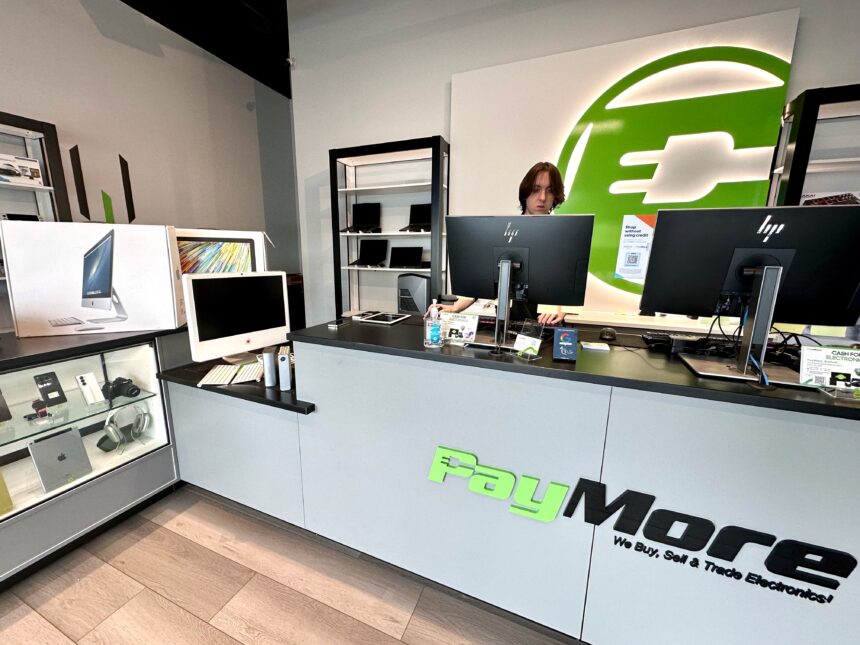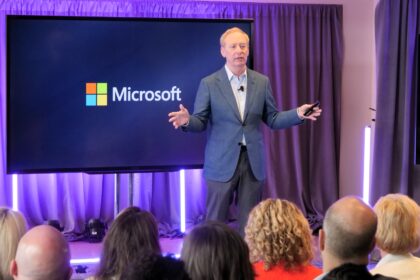The pile of tech hardware taking up space in a closet in my home has been the constant source of daydreams. Someday, I’d unload all the old iMacs, iPhones, chargers, keyboards, cables and more for a nice little payday.
When Steve Mount reached out to share the news that he planned to eventually operate a dozen PayMore stores in the Seattle area — for people who want to sell, buy or recycle used electronics — I couldn’t wait to visit a location.

Mount, a tech veteran with a telecom and software background, is the franchisee behind two PayMore locations so far — in Bellevue and Bothell, Wash. The 20-year-old chain, originally founded as a secondhand shop in New York, now has more than 70 stores in the U.S., with plans to grow substantially.
In addition to physical retail spaces, PayMore also operates an online marketplace. The company, which was recently profiled in Forbes, developed technology that provides franchise operators with real-time pricing for items on the resale market, allowing each store to know what it can afford to offer for used goods.
Mount got his start in consumer electronics and tech as a teenager working in the electronics department at Kmart and then Circuit City.
“I had always wanted to be in business for myself,” he said. “I have plenty of software ideas, but I didn’t have the capital to go and do that. So we started looking into buying a small business, and that led me down the route of looking at franchises. I ran across PayMore and it piqued my interest right away.”
‘I can’t buy this Mac’
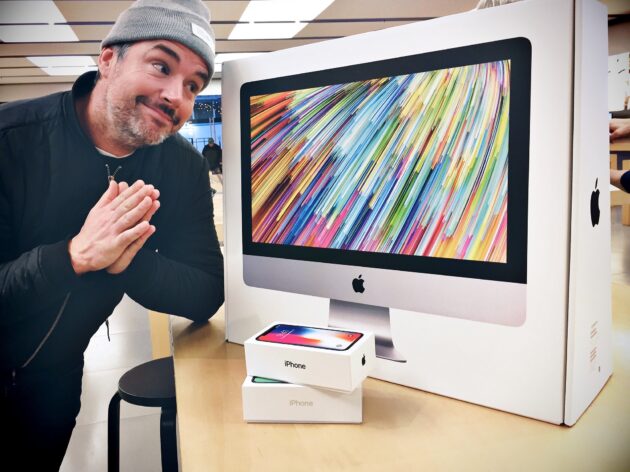
I once had plans to turn one of my old iMacs into a second monitor or a glorified TV. My kids tinkered on them for a while, playing games and watching DVDs. But the machines, dating back more than a dozen years, had long since stopped running at any reliable speed.
But something about spending hundreds of dollars on a gadget makes it hard for me to just toss it when it becomes useless. I’d rather hold onto it and remember, “Oh yeah, that was cool once.” Such is technology, and for me, Apple products especially.
Well, enough is enough. I’ve gotten into the habit of trading in my last few iPhones when purchasing a new one, and I haven’t had a desktop computer since switching to a laptop at GeekWire.
So, after raiding my plastic totes full of tech, here’s what I took on a recent visit to the PayMore store in Bothell:
- Three Apple iMac desktop computers
- Two iMac keyboards
- Two iPhones — 4 and 5s
- One iPad 2 from 2011
- Two external hard drives
- One 7-port USB hub
The store, located in a strip mall alongside a realty office, some restaurants and other businesses, wasn’t particularly busy when I walked in asking if they’d like to buy my used stuff.
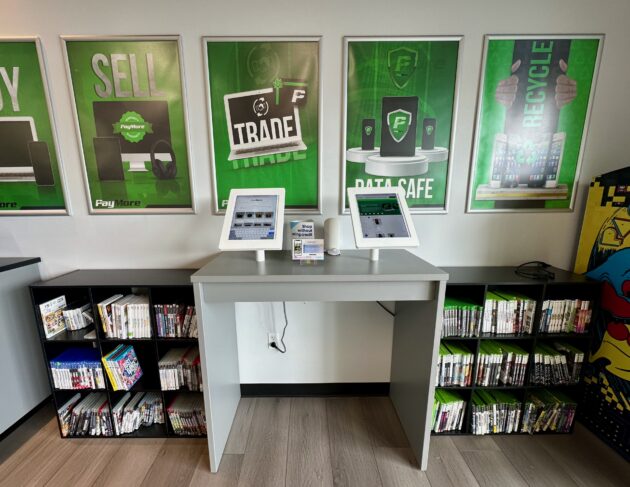
Steven Mount, son of the franchise owner, was working behind the counter. A glass case held used smartphones, cameras, headphones and other items. Video game consoles, games and laptops were on other shelves.
“I’m gonna get rich,” I remember thinking as I loaded my old computers and other items onto the counter for Steven to assess. But he didn’t exactly get wide-eyed at the sight of the iMacs.
He ran the numbers on his computer anyway — perhaps to humor me — before spelling out the problem with what I brought in.
“I can’t buy this iMac,” he said. “I think it’s a little old. iMacs are a nightmare to ship because they’re big.”
My machines had aged out of being resalable. And even if they hadn’t, unless a future resale happened in person, PayMore would have to pay more to ship a heavy 22-inch iMac than it was worth.
“There’s a certain cut off when Apple stops updating the software and you no longer get security updates,” the elder Mount told me. “It doesn’t feel like it’s that old. But when you consider the secondhand market and the way the technology pace moves and how technology is upgraded … age is the biggest factor.”
The items that PayMore does take are wiped of all data in-store, and items are held for 30 days to comply with state secondhand dealer laws in case any of it is stolen. PayMore’s tech checks serial numbers, which are added to a database used by law enforcement.
Working our way through the pile, it was hard not to chuckle at what was ahead of me. The iPhones were even older than the iMacs, and the iPad wouldn’t even power on.
It felt like I was dropping off a load of bricks.
End of the tech road
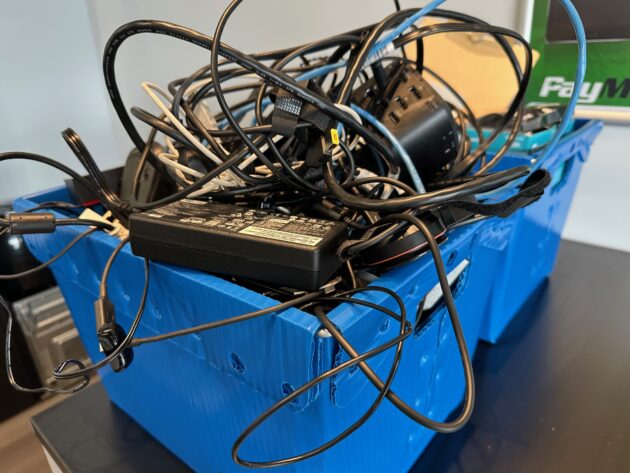
While I was waiting for Steven to give stuff the once over and look up items in PayMore’s system, a family came in and asked about buying a used Xbox. In less than 20 minutes, they left with a well-priced game console.
It may have been a machine sold to PayMore earlier that day by Sachin Kulkarni, who came back with two large bags overflowing with power cords, cables and chargers. In a bid to keep more electronics out of landfills, PayMore offers free recycling — and this stuff was clearly headed in that direction.
Kulkarni, a Microsoft software engineer, said he was moving back to India and 10 years of accumulated tech wasn’t coming with him.
“With consumer tech turnover at an all-time high and sustainability in the spotlight, we’re giving residents a secure, eco-friendly way to sell or recycle phones, laptops, gaming systems and more — without the risks of peer-to-peer marketplaces or pawn shops,” said Mount, the store owner.
Mount said the Bothell store recently recycled 1.7 tons of e-waste within a two month period of time.
I left home that day hoping for more than a feel-good recycling story. But I left PayMore with a greater appreciation for how quickly tech and electronics become obsolete.
I’d estimate the original value for my tech lot at around $5,000. I definitely got my money’s worth out of every item. All of it was well used for multiple years. As I said, holding onto it all was more a case of nostalgic appreciation for the stuff rather than any belief that I’d get back even a fraction of what I paid for it.
So when PayMore offered me just $15 — for one of the external hard drives — I wasn’t really shocked or too bummed about it. I was happy to have everything out of my house and headed toward proper recycling.
And I hadn’t wasted a lot of my time researching and listing things on eBay or another platform trying to squeeze a few more dollars out of my old stuff.
“People come in with — not to sound mean — a bunch of junk,” said Steven Mount, looking at my pile. “I want to do something for them.”
Read the full article here



